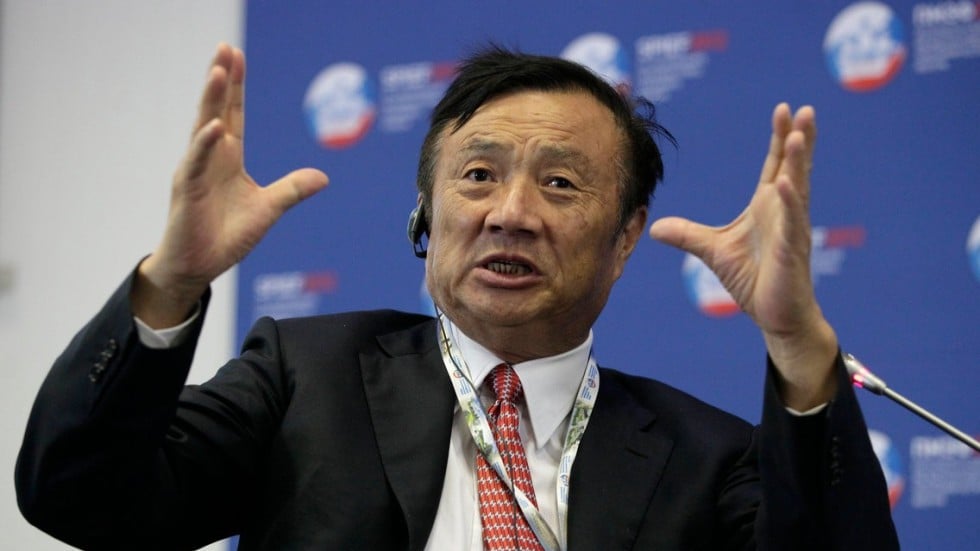Ren
Zhengfei, founder and chief executive officer of Huawei Technologies
Co., speaks during an interview at the company's headquarters in
Shenzhen, China, on Tuesday, Jan. 15, 2019. Ren, the billionaire telecom
mogul, broke a years-long silence as his technology empire faces its
biggest crisis over three decades of existence. Photographer: Qilai
Shen/Bloomberg
https://youtu.be/YNkfddyDEkk
https://youtu.be/TUqg4yrs-Po

Ren Zhengfei, the billionaire founder of Huawei Technologies, broke
years of silence on Tuesday as his business empire faces its biggest
crisis in more than three decades amid continued pressure from the US
that its networking gear may pose a security threat.
The telecoms mogul called Donald Trump “a great president” and said he
would take a wait-and-see approach to whether the US leader will
intervene in the case of his eldest daughter and Huawei finance chief Meng Wanzhou.
Meng is in Canada facing extradition to the US, where authorities have accused her of fraudulently representing Huawei
to evade US sanctions on Iran. She has denied any wrongdoing and said
that she will contest the allegations if surrendered to the US.
The emergence of the reclusive Ren, who last
spoke with foreign media in 2015, underscores the depth of the attacks
on Huawei, the largest symbol of China’s growing technological might.
“I love my country, I support the Communist
Party. But I will not do anything to harm the world,” the 74-year-old
Ren told a select round table briefing, only his third formal chat with
foreign reporters. “I don’t see a close connection between my personal
political beliefs and the businesses of Huawei.”
The US has banned government use of Huawei’s
technology products and services because of security concerns. US
security experts have warned of a range of potential security risks,
including but not limited to the capacity to control telecommunications
infrastructure and even conduct undetected espionage. It has pressed its
allies to follow suit.
Japan has excluded Huawei from public procurement and Australia and New Zealand have effectively blocked Huawei from the roll-out of their 5G network infrastructure.
The UK and Canada are also weighing the possible security risks posed
by Huawei — along with a growing list of other European countries.
Huawei has consistently denied any connections
with the military, saying that it is a private company part-owned by its
employees and that governments need to ensure there is an objective
basis for choosing technology vendors.
Developing markets like Huawei gear as it is cheap, reliable
Ren, who joined the Communist Party after
leaving the People’s Liberation Army, stressed the potential for
cooperation with the US. He played down Huawei’s role in current trade
tensions between Washington and Beijing, which have rattled investors
and corporations worldwide.
“Huawei is only a sesame seed in the trade
conflict between China and the US,” Ren said from the company’s newest
campus in the industrial city of Dongguan.
“Trump is a great president. He dares to
massively cut tax, which will benefit the business. But you have to
treat well the companies and countries so that they will be willing to
invest in the US and the government will be able to collect enough tax.”
Meanwhile, China's Foreign Ministry on Tuesday
urged Canada to release Meng immediately, saying the case was an abuse
of legal procedure. Ministry spokeswoman Hua Chunying made the comment
at a daily news briefing in Beijing.
Meng was released on bail five weeks ago and is
living under restrictions in her multimillion-dollar Vancouver home
while awaiting extradition proceedings.
The arrest in Poland last week of a sales executive accused of spying may have helped prompt Ren to personally marshal Huawei’s global response. The employee in Poland was subsequently fired by Huawei, which said the individual had brought the company into disrepute.
Why Huawei and its CFO Meng Wanzhou are caught up in the US-China trade war
Ren expressed hope that Huawei could find a way forward with the US.
“Huawei is not a public company, we don’t need a
beautiful earnings report,” Ren said. “If they don’t want Huawei to be
in some markets, we can scale down a bit. As long as we can survive and
feed our employees, there’s a future for us.”
Ren is a legendary figure in China’s business
world and moves in the highest government circles. The self-made
billionaire is the son of schoolteachers and grew up in a mountainous
town in China’s poorest province, Guizhou.
Huawei founder and CEO Ren Zhengfei survived a famine, but can he weather President Trump?
A survivor of China's great famine between 1958
and 1961, Ren graduated from the Chongqing Institute of Civil
Engineering and Architecture. He worked in the civil engineering
industry until 1974 when he joined the PLA as an engineer – a connection
that still provokes questions in the West about Huawei’s ties to the
Chinese army and government.
This article appeared in the South China Morning Post print edition as: Huawei founder breaks silence amid US attacks
Related:
Related posts:
...
A true multinational - Newspaper headline: A Huawei Technologies Co logo sits on display inside an electronic goods store in Berlin on .
Related:
Related posts:
...
A true multinational - Newspaper headline: A Huawei Technologies Co logo sits on display inside an electronic goods store in Berlin on .
























